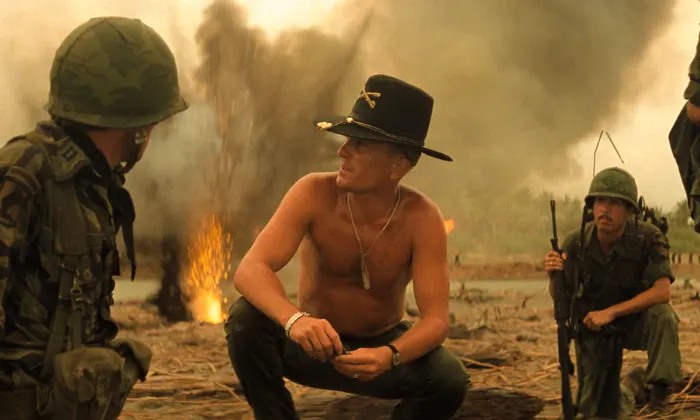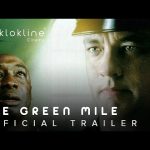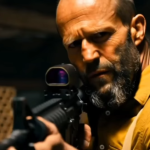Apocalypse Now 1979

Francis Ford Coppola’s “Apocalypse Now” (1979) is a cinematic masterpiece that transcends its war genre origins to become a profound exploration of human nature, morality, and the horrors of conflict. Inspired by Joseph Conrad’s novella “Heart of Darkness,” the film plunges viewers into the depths of the Vietnam War, where the line between civilization and savagery blurs amidst the backdrop of a surreal and nightmarish landscape.
Set during the Vietnam War, “Apocalypse Now” follows Captain Benjamin L. Willard, portrayed by Martin Sheen, as he embarks on a mission deep into the Cambodian jungle to assassinate Colonel Walter E. Kurtz, played by Marlon Brando. Kurtz, once a decorated soldier, has become a renegade who has embraced his own primal instincts, ruling over a local tribe with cult-like reverence.

At its core, “Apocalypse Now” is a journey of moral reckoning and existential crisis. As Willard travels upriver, accompanied by a ragtag crew of soldiers on a Navy patrol boat, he confronts the brutality of war and the darkness within himself. The film’s narrative unfolds like a fever dream, punctuated by surreal encounters with characters such as Lieutenant Colonel Bill Kilgore, known for his iconic line “I love the smell of napalm in the morning,” and a disillusioned photojournalist who captures the absurdity of war through his lens.
Visually and thematically, “Apocalypse Now” is a tour de force. Coppola’s direction immerses viewers in a visceral and sensory experience, from the haunting opening sequence set to the sounds of Jim Morrison’s “The End” to the operatic crescendo of Kurtz’s compound. The film’s cinematography, characterized by lush jungle landscapes and hallucinatory montages, mirrors the characters’ descent into madness and the moral ambiguity of their mission.

Central to the film’s impact is Marlon Brando’s enigmatic portrayal of Colonel Kurtz. His mesmerizing presence, shrouded in shadow and mystique, epitomizes the duality of human nature—heroism and barbarism, enlightenment and madness. Brando’s improvised monologues, delivered in a voice weighted with disillusionment and existential angst, challenge Willard—and the audience—to confront the contradictions of war and the darkness that lurks within us all.
The ensemble cast, including Martin Sheen as Captain Willard, Robert Duvall as Lieutenant Colonel Kilgore, and Dennis Hopper as the manic photojournalist, deliver powerhouse performances that breathe life into Coppola’s sprawling narrative. Each character embodies a facet of the war’s impact on the human psyche, from Kilgore’s cavalier brutality to Willard’s introspective quest for meaning amidst chaos.

Thematically, “Apocalypse Now” transcends its Vietnam War setting to explore universal truths about power, corruption, and the fragility of civilization. The film critiques the hubris of imperialist ambitions and the moral decay wrought by unchecked authority. Through its allegorical framework, “Apocalypse Now” invites viewers to contemplate the consequences of unchecked ambition and the existential crisis that accompanies confronting the darkness within oneself.
As a work of cinema, “Apocalypse Now” continues to resonate with audiences and critics alike, its legacy enduring through generations. The film’s uncompromising vision, coupled with its thematic richness and technical innovation, has solidified its place in cinematic history as a landmark achievement in storytelling and visual artistry.
In conclusion, “Apocalypse Now” (1979) remains a powerful testament to the human experience in times of war and moral ambiguity. Through its haunting imagery, unforgettable performances, and profound thematic exploration, the film invites viewers to confront the depths of the human soul and the existential challenges of confronting one’s own “heart of darkness.”











